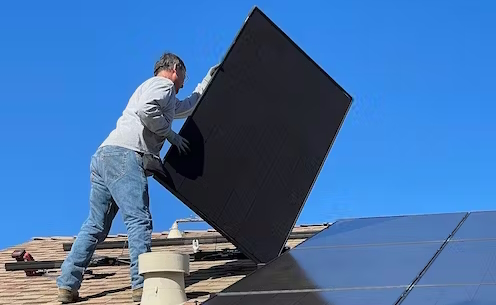As Australia’s carbon offset industry grapples with integrity concerns, how can companies genuinely tackle climate change?
- Written by Andrew Macintosh, Professor and Director of Research, ANU Law School, Australian National University

Australia’s largest carbon market player, GreenCollar, has quit the[1] federal government’s voluntary carbon neutral program, Climate Active. More than 100 companies have left the program in the past two years[2].
Climate Active provides certification to businesses and other organisations to verify that they are carbon neutral. Certification is supposed to mean an organisation has neutralised the impacts its greenhouse gas emissions have on global warming by buying carbon offsets, which represent emission reductions achieved elsewhere.
GreenCollar is among many Australian organisations that develop emissions-reduction projects[3], such as storing carbon in vegetation. Upon exiting the Climate Active scheme, GreenCollar co-founder James Schultz told The Australian[4] that Climate Active had become too risky, due to criticism from environmentalists the carbon abatement associated with offsets is often not genuine.
Electricity retailer EnergyAustralia has also acknowledged “legitimate public concern[5]” about carbon offsets and programs such as Climate Active that rely on them.
Effective carbon offset projects do exist in Australia. However, research[6] by my colleagues and I, and many other experts[7], has found integrity issues are widespread in carbon offset schemes – and low integrity projects are all too common, including in Australia.
So how has this situation arisen, and what should companies do to genuinely reduce their climate impact?
What are carbon offsets for?
Every day, companies emit greenhouse gas emissions. This can occur directly from their own operations, or indirectly through electricity they use and products they consume. Some emissions can be cut easily and cheaply, but others are harder and more expensive to reduce.
Carbon credits emerged to fill this gap. Where it is expensive for companies to reduce their own emissions, they can buy carbon credits to offset them. Each credit is supposed to represent one tonne of carbon abatement.
For the credits to be legitimate, they must represent real, additional and permanent abatement. Real refers to whether the emissions abatement has actually occurred. Additional means the abatement would not have occurred without the incentive provided by the crediting scheme. Permanent means the carbon stored in, say, planted trees, will stay there over the long term.
Under the scheme, companies that buy carbon credits to offset their emissions can be certified as “carbon neutral”.
A key problem is that companies can purchase old, super-cheap credits issued under[9] the Kyoto Protocol’s Clean Development Mechanism. These credits[10] come from overseas projects such as windfarms and landfill gas projects overseas.
Serious doubts exist over the integrity of these credits. For example, a comprehensive review[11] by European researchers in 2016 found the credits had “fundamental flaws” and most were “not providing real, measurable and additional emission reductions”.
Historically, these cheap credits have accounted for most carbon credits[13] used in the Climate Active scheme.
The remainder have come from the Australian carbon offset scheme, which issues Australian Carbon Credit Units (ACCUs). But this scheme has also been plagued by integrity problems such as:
These problems exist in carbon offset schemes around the world. Last year, an international group of researchers assessed[14] carbon credits covering almost one billion tonnes of carbon dioxide equivalent. They found less than 16% constituted real emission reductions.
Where to now?
So what should be done?
The first step is for companies to ensure they are investing in high-integrity projects. In overseas markets, ratings agencies exist to assist with this[15]. In Australia, ratings agencies do not assess domestic projects because the federal government doesn’t publish enough information to make this possible.
The government could help companies invest in genuine emissions reductions by requiring more transparency from carbon offset projects, and ensuring relevant information is publicly accessible.
Rather than purchasing carbon abatement, companies may be better off directly cutting their own emissions as much as possible, by changing the way they operate. This might mean investing in new low-emissions equipment, reducing air travel by employees, or switching to green electricity.
Companies can also make direct investments in quality projects which help mitigate climate change and support biodiversity conservation.
And the federal government should clamp down on the significant number of low integrity offset projects in Australia’s offset scheme.
In response to issues raised in this article, a spokesperson from the Department of Climate Change, Energy, the Environment and Water, which oversees Climate Active, said:
The Australian Government is actively considering the future direction of the Climate Active program. We recognise that Climate Active needs reform and that work is under way as a priority that will involve proper consultation.
The Climate Active program continues to operate, certifying entities that have met the program requirements.
The Australian Government continues to work to ensure the integrity of the ACCU Scheme, following recent reviews by the Climate Change Authority (CCA), independent experts and the Australian National Audit Office. These reviews have found the ACCU Scheme is well designed, well administered, and contributing to Australia’s transition to net zero by 2050.
References
- ^ has quit the (www.theaustralian.com.au)
- ^ past two years (www.smh.com.au)
- ^ develop emissions-reduction projects (greencollar.com.au)
- ^ told The Australian (www.theaustralian.com.au)
- ^ legitimate public concern (www.theaustralian.com.au)
- ^ research (www.nature.com)
- ^ many other experts (www.carbonintegrity.au)
- ^ Alex Cimbal/Shutterstock (www.shutterstock.com)
- ^ issued under (unfccc.int)
- ^ These credits (cer.gov.au)
- ^ comprehensive review (climate.ec.europa.eu)
- ^ Tracey Nearmy/AAP (photos.aap.com.au)
- ^ most carbon credits (cer.gov.au)
- ^ assessed (www.nature.com)
- ^ assist with this (bezerocarbon.com)




















